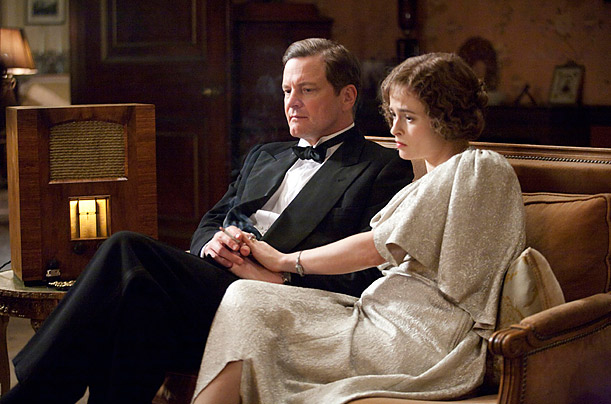
Nominees:
Black Swan
The Fighter
Inception
The Kids Are All Right
The King's Speech (WINNER)
127 Hours
The Social Network
Toy Story 3
True Grit
Winter's Bone
Oh, why did the Academy switch from five to 10 Best Picture nominees? Actually, we know why: because the members were chagrined when The Dark Knight was denied a 2009 nomination, which meant the loss of the one megapopular movie that might lure a large audience to the Oscar telecast. (Last year, when the all-time box-office champ, Avatar, was a finalist, the ratings snapped back up.) But having a larger field, we keep saying, is useless unless the Academy has a countdown system that eliminates some candidates throughout the evening, with just two or three left standing at the climax. It's called suspense. They used to be good at that in Hollywood.
This year's deca-list contains two pure-indie entries (The Kids Are All Right and Winter's Bone), the year's highest-grossing picture (Toy Story 3) and the most popular movie that was not a sequel or a remake (Inception), plus the only feel-good film about a, well, dis-arming (127 Hours). None of these would have been among the top five — not if the Best Director nominees are a good guide to the Academy's favorite films, as they usually are. By that standard, the final quintet would be Black Swan, The Fighter, The King's Speech, The Social Network and True Grit. But 10 nominees or five, this year there are only two: the story of Zuckerberg Unbound and the Tale of Stammering George. And barring an upset, really just one: The King's Speech.
Why, then, won't The Social Network beat The King's Speech? Its pace is snappier, its IQ higher, its ambitions greater, its subject more modern. One other thing: it believes there's no crying in a Facebook film. It doesn't give the audience a strong hero to root for. The Social Network's Zuckerberg might earn the envy of viewers, but Colin Firth's George VI wins their sympathy. Like a lot of moviegoers, the Academy members go for heart over head, warm over cool. And in the race for the ultimate Oscar, given the choice between a film they respect and one they love, they'll take love every time.
The examples are legion. The soppy Going My Way won Best Picture over the cynical Double Indemnity (1945); My Fair Lady was chosen over Dr. Strangelove (1965); The Sound of Music over Darling (1966); In the Heat of the Night over Bonnie and Clyde and The Graduate (1968); The Sting over The Exorcist and Cries and Whispers (1974); Rocky over All the President's Men, Bound for Glory, Network and Taxi Driver (1977); Ordinary People over Raging Bull (1981); Chariots of Fire over Reds (1982); Driving Miss Daisy over Born on the Fourth of July (1990); Dances with Wolves over Goodfellas (1991); Titanic over L.A. Confidential (1998); and Shakespeare in Love over Saving Private Ryan (1999).
There's one more salient example, from the Oscar race in 1942. A widely praised film about a wayward media mogul — with genius galore but no central sympathetic character — was up against a sentimental, well-wrought family drama set in the United Kingdom. The first movie earned all the respect; the second made people cry. And in the end, the family drama, How Green Was My Valley, won Best Picture over Citizen Kane.
The Social Network might be within calling distance of a great film. But it's better to be the King.